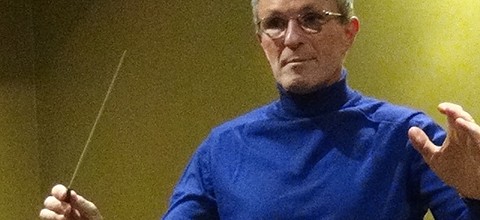Mark Eager holds his score of Haydn’s Clock Symphony.
As conductor of the Welsh Sinfonia, a Cardiff-based professional chamber orchestra, he is in Cardiff’s Village Hotel minutes before leaving for a concert in Milford Haven, indicative of his busy musical career. He lives in Salisbury and London with his wife, and also serves as a conductor for The Londamis Ensemble and Cardiff University Symphony Orchestra.
 Mark says immersing himself in an orchestral score is just like reading a book for him.
Mark says immersing himself in an orchestral score is just like reading a book for him.
Growing up with the trombone
Mark was born in London in 1962 before moving to Newcastle, his first musical memories from family associations with Salvation Army bands. “I was immersed from day one,” he explains. “From five or six, my grandad started teaching me the trombone.”
“[The Royal Academy] is only for those who only want to perform”
The trombone made such an impression on him that he went on to study it at The Royal Academy of Music in London. Renowned for its very high standards, he explains that the college is not for anyone who is indecisive about their future, “Performance music is only for those who only want to perform, and there’s nothing else on their agenda.”
Trombone career comes to an end
After years of freelance musicianship, he landed his dream job in 1993 as principal trombonist in the BBC National Orchestra of Wales. But that ended in 2005 when a concerto commissioned for him by the BBC and written by Welsh composer Alun Hoddinott halted his ability to play the trombone forever due to muscle damage.
“It was meant to be a real tour de force for a top professional, which indeed sadly, it was,” he admits. From the moment he started having issues, he knew that was the end of his trombone career due to the total confidence that players of his standard required, “If I had to play a solo at the Royal Albert Hall, was I going to look in the mirror at my face and think ‘are you going to work today?’ and I never wanted that feeling.”
But the biggest ‘back on track’ moment for Mark was getting a scholarship to the Orkney Conductor’s Course. As a late entry, he had to prepare 21 scores in just six days. “I immersed myself in these scores, and I was just in heaven,” he reveals.
Mark talks about Cardiff’s musical life:
Today, his focus is on getting younger musicians involved. “I’ve always believed music should be on the agenda in every school,” he says. The Welsh Sinfonia are currently taking part in a project called Crescendo. The project sees the orchestra working with five schools over five years to promote orchestral music making. Mark says “What I’m trying to do is take an orchestra into a school, if a kid leaves a school without ever having heard an orchestra, the chances of them going to an orchestral concert are pretty much zero.”
First of all, the children sit next to the professionals in the orchestra, then attend a concert by them, creating a relationship with the musicians as well as encouraging the children to listen, which he considers important for people who aren’t from a musical upbringing.
His career is different now from his trombone days, but he describes the orchestra as his “instrument” to really express himself.
